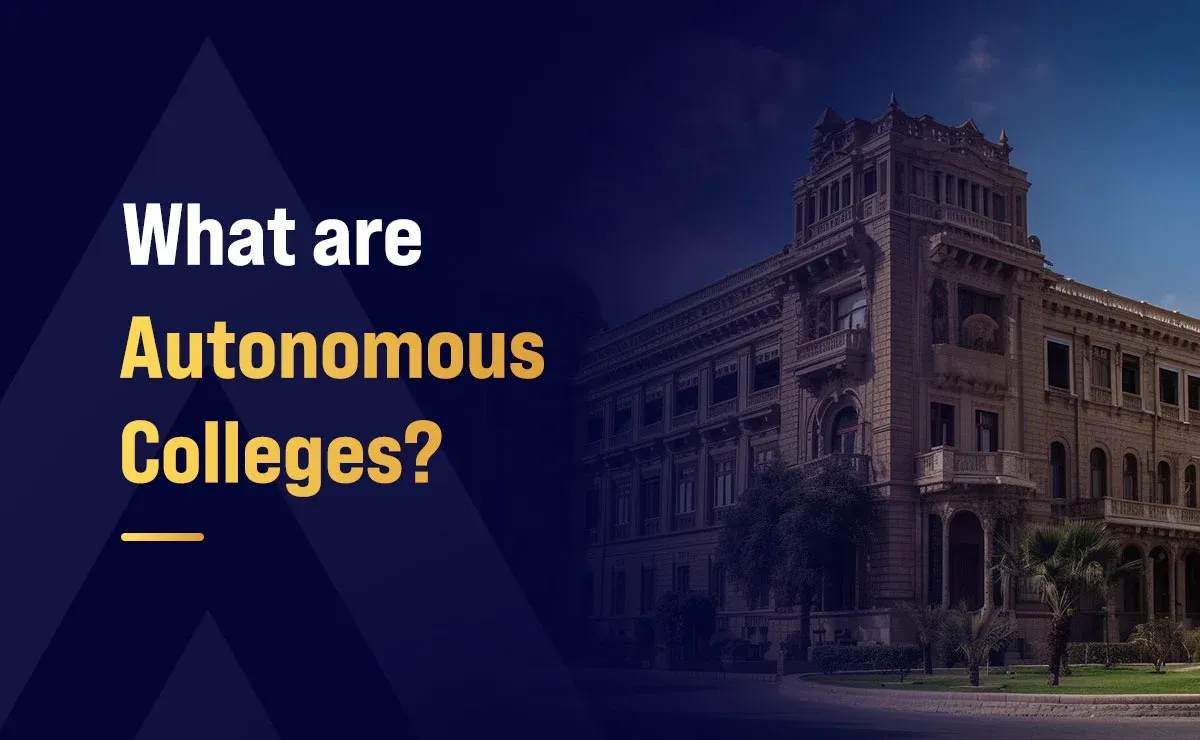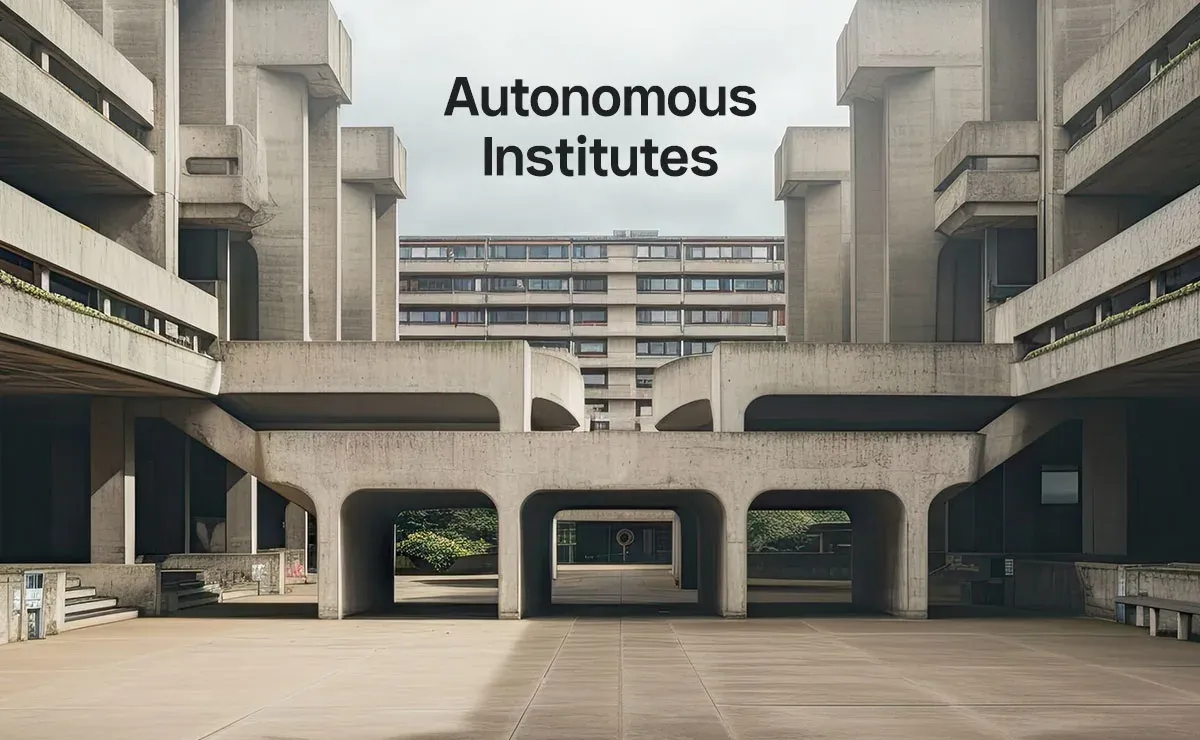What are Autonomous Colleges?

In India, higher education institutions are classified into different categories based on their level of independence, governance structures, and affiliations. One important category is autonomous colleges.
The differences between an autonomous college and other universities go beyond their affiliations and academic offerings. It extends to curriculum flexibility, admissions processes, and fee structures.
This article will break down what autonomous colleges are, how they operate, and how they compare to other universities, so students can make informed decisions about their higher education choices.
Education isn't just about structure or status—it’s about how deeply it supports a student’s ability to grow and make sense of the world. If you’d like to see how we’re creating space for students to think independently and learn with purpose, take a look at our Pgp Program.
What is the Meaning of an Autonomous College?

An autonomous college is an institution that has the authority to operate independently of the university to which it is affiliated. It has the flexibility to run its own academic curriculum, conduct examinations, and set evaluation criteria.
This means that the college is free to make key decisions independently without direct control from the governing university. The autonomy given to such colleges is usually approved by the University Grants Commission (UGC) and is intended to promote academic excellence and innovation.
Despite their academic and administrative autonomy, autonomous colleges still operate under a university's umbrella. This means they are affiliated with a university but are empowered to create their own syllabus, design courses, and conduct exams.
Nevertheless, the degree conferred upon completion of a program is issued by the university with which the college is affiliated, rather than by the autonomous college itself.

The important characteristics of an autonomous college are:
- Academic Autonomy: The ability to design the curriculum, teaching methods, and assessment.
- Examination Authority: Conducts its own exams and declares results independently.
- Flexibility: Ability to introduce innovative courses and update syllabus based on industry needs.
- Affiliation: Often affiliated with parent universities and government agencies but operates independently in academics.
- Decision-Making Power: Authority over admissions, fee structures, and faculty appointments.
- UGC Recognition: Acknowledged by the University Grants Commission (UGC) for having academic autonomy
- Quality Focus: Tailors education to enhance employability and industry readiness.
- Fast Decision-Making: Streamlined administrative processes for quicker implementation of policies.
Top Autonomous Colleges in India
The Indian Institutes of Management (IIM) colleges are unquestionably among the best autonomous colleges in India. They are associated with the Ministry of Education, Government of India, and have consistently ranked among the finest autonomous management institutions in the country by NIRF.
Other than IIMs, here are some of the most well-known autonomous colleges in India:
- St. Xavier's College, Mumbai
- Narsee Monjee College of Commerce & Economics, Mumbai
- Jawaharlal Nehru Technological University (JNTU) Kakinada, Andhra Pradesh
- St. Joseph's College of Commerce, Bangalore
- The National Institute of Engineering, Mysore
- Sardar Patel College of Engineering, Mumbai
- Mount Carmel College, Bangalore
- B.K. Birla College of Arts, Science & Commerce, Maharashtra
- Presidency College, Madras
- CMR Institute of Management Studies, Bangalore
These colleges not only provide quality education but also have the freedom to make changes in the curriculum, assessments, and teaching methodologies, which sets them apart from regular colleges affiliated with universities.
What is the Difference Between a Deemed-to-be University, an Autonomous College, and a Non-Autonomous College?
When choosing a higher education institution in India, it is important to understand the differences between universities, autonomous colleges, and private institutions. These types have different features, working autonomy, and scholarship models.

The Definition of Deemed to be University:
A deemed-to-be university is a higher education institution recognized by the Department of Higher Education (DHE) based on UGC’s advice for maintaining superior academic standards in particular fields. It is granted university status under Section 3 of the UGC Act, 1956, offering it the liberty to design its curriculum, handle admissions, and confer degrees.
They offer diverse programs across medical education, social sciences, IT, and more. Deemed universities play an important role in enhancing higher education in India, with periodic evaluations to ensure transparency and accountability.
What are Non-Autonomous Colleges?
Non-autonomous colleges in India are learning institutions affiliated with a parent university. These universities follow the rules and regulations of their curricula, with minimal or no chance of amending their academic structures. The university controls the examination process, such as question paper setting and evaluation, and ensures uniformity across all affiliated colleges.
Most non-autonomous colleges have their admissions on the basis of entry examination or on merit as laid down by the parent university. Although they are not autonomous, these colleges share the reputation and credibility of their parent universities, making them a favorite among many students who are interested in structured and standardized learning experiences.
Differences:
Below, these institutions are compared across key categories.
Categories | Deemed-to-be Universities | Autonomous Colleges | Non-Autonomous Colleges |
Academic Freedom | These institutions enjoy full autonomy in designing their courses, syllabi, teaching methods, and admissions processes. They are free to offer innovative programs tailored to industry needs. | These colleges operate with significant academic independence, allowing them to frame their curricula, conduct examinations, and introduce new courses. However, their degrees are awarded by the parent university they are affiliated with. | Non-autonomous colleges strictly adhere to the academic structure and curriculum set by their affiliated universities. Changes in syllabi or examination patterns depend on the parent university’s approval and timelines. |
Degree Awarding Power | They can grant their degrees and diplomas independently without relying on a parent university. These degrees are completely recognized by the UGC and other regulatory bodies | While they have the freedom to manage academic activities, the degrees for their courses are granted by their affiliated universities. | The examination process and degree awarding are directly controlled by the affiliated university. These colleges have no say in degree design or the assessment framework. |
Governance and Autonomy | These universities are granted autonomy by the Department of Higher Education (DHE) based on the recommendation of the UGC. They operate independently but under the broad regulations of statutory bodies like the AICTE or MCI, depending on the courses offered. | They function with administrative and academic autonomy but are still under the jurisdiction of their parent university. The government has minimal interference in their day-to-day operations. | Non-autonomous colleges are governed centrally by their affiliated universities. The university oversees academic and administrative decisions, leaving limited room for independent operation. |
Funding and Financial Structure | They can be either public or private. Public deemed universities receive government funding, while private ones rely on tuition fees and other revenue sources. | These colleges are generally funded by the government or parent university but have the liberty to manage their own financial operations independently. | Funding and financial decisions are regulated by the parent university or the government (for public colleges). They have limited freedom to introduce new fee structures or raise funds independently. |
Ownership | These institutions are neither completely private nor completely under the government. They are institutions of higher education that are granted university status by the Indian government and are affiliated with the University Grants Commission (UGC). |
Since they have achieved autonomous status by the Ministry of HRD, Govt. of India, they are neither private nor government institutions. | Non-autonomous colleges can be both government and private colleges. |
FAQs
Q1. What sets an autonomous college apart from a non-autonomous college?
Ans: Autonomous colleges are granted the freedom to create their curriculum, conduct examinations, and evaluate students independently, allowing them to respond quickly to industry demands.
Non-autonomous colleges follow the curriculum, examination patterns, and rules set by their affiliating universities, maintaining uniformity but limiting flexibility.
Q2. Is a deemed university private or government?
Ans: A deemed university can be either private or government owned. Its status depends on its founding entity, but all deemed universities operate with autonomy in academics, curriculum, and admissions, as granted by the Department of Higher Education (DHE) under UGC guidelines.
Q3. What differentiates a deemed university from a private university?
Ans: Deemed universities are recognized by the government for excellence in specific fields and enjoy academic autonomy while still being regulated by the UGC.
Private universities are established by private entities with state government approval, operate independently, and are not declared by the government as deemed.
Q4. Is an autonomous college good or bad?
Ans: An autonomous college is generally beneficial as it offers flexibility in curriculum design, industry-relevant courses, and quicker results. However, its quality depends on the institution you choose, its governance, and the implementation of its autonomy.
Q5. Which college is better: autonomous or private?
Ans: Autonomous colleges are better for students seeking academic flexibility and industry-oriented programs, especially if affiliated with reputed universities.
Private colleges may be better for those seeking modern infrastructure, specialized programs, or institutions that are independent of government-affiliated systems.
The choice ultimately depends on the student’s goals and the institution's reputation.
The Altera Institute’s PGP in Applied Marketing
In recent years, there has been a surge in innovative educational models introduced as modern alternatives to traditional colleges. This is especially true for management education, where autonomous institutes like IITs stand out in their approach to providing industry-relevant, practical-based learning experiences.
Recognizing that traditional MBA programs have been slow to adapt to the changing industry standards and innovation, institutions like the Altera Institute have introduced programs designed to prepare students for digital-first careers.
It provides a 15-month PGP in applied marketing whose curriculum is designed in partnership with the industry leaders and specializes in:
- Hands-on learning experience in the form of immersion and action-based learning.
- Direct insights and strategic guidance from professionals with proven industry track records.
- Holistic exploration of contemporary digital business transformation frameworks.
With over 3,000 professionals trained across multiple cohorts and programs, the Altera institutes offer a compelling route to excel in digital-first marketing roles like brand, product, and eCommerce.
Summing Up
The decision taken on which kind of institution to attend in higher education is based on the dream of the student, career ambitions, and learning styles. The independent colleges are flexible and innovative; the so-called universities are academically sound in niche subjects; independent universities also have modern infrastructure; and non-autonomous colleges are well-organized educators.
Each type has its unique strengths, and understanding these distinctions empowers students to make informed decisions. Ultimately, the quality of education, faculty, and overall institutional reputation play a crucial role in shaping a student’s academic and professional journey.
By carefully considering their priorities, students can choose an institution that aligns with their ambitions and sets them on the path to success.





